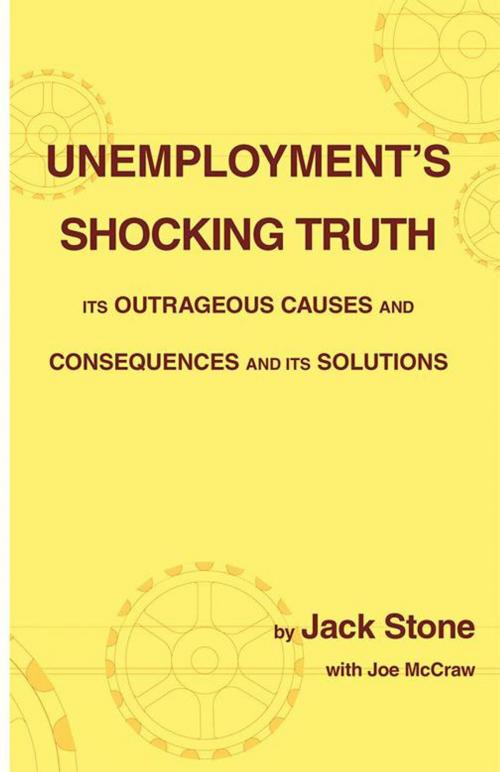Unemployment's Shocking Truth
Its Outrageous Causes and Consequences and Its Solutions
Nonfiction, Social & Cultural Studies, Political Science, Politics, Economic Conditions| Author: | Jack Stone | ISBN: | 9781490769943 |
| Publisher: | Trafford Publishing | Publication: | June 3, 2008 |
| Imprint: | Trafford Publishing | Language: | English |
| Author: | Jack Stone |
| ISBN: | 9781490769943 |
| Publisher: | Trafford Publishing |
| Publication: | June 3, 2008 |
| Imprint: | Trafford Publishing |
| Language: | English |
About the Book
This book does not take a neutral stand on the issue of mass unemployment. It is an effort to expose capitalism's most outrageous feature - its compulsive need to use unemployment and the fear of unemployment to ensure the docility and subservience of its workers. Under the capitalist system, the stick of the fear of unemployment is necessary to keep workers' noses to the grindstone and make them perform to the satisfaction of their employers. The stick is needed because much work is boring, the carrot paid is less than a living wage, provides workers very little or no control over the work process, and stifles creativity - in short because the total carrot offered to numerous workers is so woefully inadequate. Under a different system, one in which working people participated fully in the decisions affecting what, how and for what purpose goods and services were produced; if we had a system based on economic democracy, there would be no need to use the stick of the fear of unemployment. The creativity of most of the millions of working people, now mostly dormant, would be awakened and the volume and quality of improvements and inventions especially in housing, energy, transit systems and health care would be so great as to tower high above and completely overshadow the number and purpose of the innovations created under the present system.
The issue of unemployment is shrouded in half-truths and outright lies. As a result, there is almost total ignorance about the real causes of unemployment and worse still, about its very serious consequences. Many claim that there are enough jobs but that the unemployed are lazy and would rather be on welfare. While this may be true of a very small fraction of the unemployed, it is not true of the overwhelming majority. There have been numerous instances in which whenever advertisements calling for applicants for relatively well-paid jobs or for jobs that paid better than the minimum wage, the number of applicants that applied for those jobs were ten or more times greater than the number of jobs that were advertised.
In September 26th of 1984, to mention just one instance, the Associated Press News Agency reported that "50,000 people lined up for 350 jobs." The report went on to say that "the applicants, some of whom waited in line for two days, hope to land a longshoreman's job paying $15.45 an hour or a marine clerk's job earning $17.45 an hour... However the fact that only 350 jobs are currently available didn't dismay the crowd, which queued up in a line in the San Pedro district [of Los Angeles] that stretched for 13 mile..."
Clearly, the majority would rather have gainful employment at a living wage and live a life of dignity and integrity. Furthermore apart from the simple need to earn a living, productive employment is an indispensable part of the psychological makeup of human beings. Simply put, people want to feel useful. Prolonged joblessness is a serious threat to a person's self-esteem and destroying that self-esteem has appalling consequences.
The ugly truth is that the system under which we live will not or cannot provide jobs for those who need them. The business class is simply not interested in full employment because mass unemployment provides them with many benefits. Among those benefits: a large pool of unemployed workers drives down the wages employers have to pay.
About the Book
This book does not take a neutral stand on the issue of mass unemployment. It is an effort to expose capitalism's most outrageous feature - its compulsive need to use unemployment and the fear of unemployment to ensure the docility and subservience of its workers. Under the capitalist system, the stick of the fear of unemployment is necessary to keep workers' noses to the grindstone and make them perform to the satisfaction of their employers. The stick is needed because much work is boring, the carrot paid is less than a living wage, provides workers very little or no control over the work process, and stifles creativity - in short because the total carrot offered to numerous workers is so woefully inadequate. Under a different system, one in which working people participated fully in the decisions affecting what, how and for what purpose goods and services were produced; if we had a system based on economic democracy, there would be no need to use the stick of the fear of unemployment. The creativity of most of the millions of working people, now mostly dormant, would be awakened and the volume and quality of improvements and inventions especially in housing, energy, transit systems and health care would be so great as to tower high above and completely overshadow the number and purpose of the innovations created under the present system.
The issue of unemployment is shrouded in half-truths and outright lies. As a result, there is almost total ignorance about the real causes of unemployment and worse still, about its very serious consequences. Many claim that there are enough jobs but that the unemployed are lazy and would rather be on welfare. While this may be true of a very small fraction of the unemployed, it is not true of the overwhelming majority. There have been numerous instances in which whenever advertisements calling for applicants for relatively well-paid jobs or for jobs that paid better than the minimum wage, the number of applicants that applied for those jobs were ten or more times greater than the number of jobs that were advertised.
In September 26th of 1984, to mention just one instance, the Associated Press News Agency reported that "50,000 people lined up for 350 jobs." The report went on to say that "the applicants, some of whom waited in line for two days, hope to land a longshoreman's job paying $15.45 an hour or a marine clerk's job earning $17.45 an hour... However the fact that only 350 jobs are currently available didn't dismay the crowd, which queued up in a line in the San Pedro district [of Los Angeles] that stretched for 13 mile..."
Clearly, the majority would rather have gainful employment at a living wage and live a life of dignity and integrity. Furthermore apart from the simple need to earn a living, productive employment is an indispensable part of the psychological makeup of human beings. Simply put, people want to feel useful. Prolonged joblessness is a serious threat to a person's self-esteem and destroying that self-esteem has appalling consequences.
The ugly truth is that the system under which we live will not or cannot provide jobs for those who need them. The business class is simply not interested in full employment because mass unemployment provides them with many benefits. Among those benefits: a large pool of unemployed workers drives down the wages employers have to pay.















